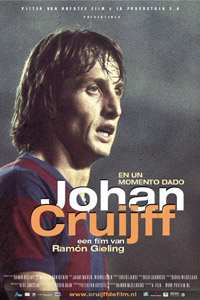Cruyff was one of a number of youngsters who emerged with Ajax of Amsterdam in the late Sixties and came to dominate European and world football in the early Seventies.
Cruyff was the most outstanding of them all and was seen by many as the natural successor to Pele as the world's greatest player.
He won a hat-trick of European Cups with Ajax, the World Clubs' Cup and was three times European Footballer of the Year. At their peak, the Dutch side he captained were the most exciting and talented team in international football, yet, strangely, they never won a major trophy during his reign.
Total Football was not a new idea when the Dutch picked it up. It had been around since the Fifties when it was known as The Whirl. But it was first Ajax then Holland that brought it to prominence.
The idea was to build a team in which all of the players had equal levels of technical ability and physical strength. In its execution it meant that all the players were capable, at any point in a game, of switching into each other's roles as circumstances demanded.
Anyone could do anything. Defenders became forwards, forwards became defenders.
Strictly speaking, Cruyff played centre forward in this system. But he would drop deep to confuse his markers or suddenly move to the wing with devastating effect. Once there, according to the reference book Soccer: The World Game, "a favourite trick out on the left-wing was to drag the ball behind him with his right foot, turn through 180 degrees and accelerate away outside a bemused defender."
No one had seen a centre forward like that before.
Cruyff was born in Amsterdam in 1947 close to the Ajax ground. His mother worked as a cleaner at the club and it was she who persuaded the coaches to admit her son to their youth development system at the age of 12.
It was the English coach Vic Buckingham who recommended that the club sign him on a contract and Cruyff made his senior debut when he was 17. Naturally, he scored. Two years later he was playing for Holland, grabbing the last-minute equaliser in his first match - a 2-2 draw against Hungary.
Dutch football, traditionally, had been largely amateur. But by the mid-1960s it was beginning to make the change to a professional game. The most influential man in the development of the country's football was Rinus Michels who became manager of Ajax in 1964. Within seven years his team was the best in Europe.
Bill Shankly's Liverpool suffered an early taste of what was to come, losing 5-1 to Ajax in Amsterdam in a European tie. By 1968 Ajax had won a hat-trick of Dutch Championships and the following season reached the final of the European Cup. They lost 4-1 to AC Milan, but were on the brink of achieving greatness.
Cruyff had grown into a powerful, long-striding athlete. He had wonderful balance, deadly speed and breathtaking ball control. But his greatest quality was vision, based on an acute sense of his team-mates' positions as an attack unfolded.
The sports writer David Miller believed Cruyff superior to any previous player in his ability to extract the most from others. He dubbed him "Pythagorus in boots" for the complexity and precision of his angled passes and wrote: "Few have been able to exact, both physically and mentally, such mesmeric control on a match from one penalty area to another."
http://www.ifhof.com/hof/cruyff.asp
A Tribute: https://www.youtube.com/watch?v=21d8_BqMaMw




 ) who was not picked, but Jongbloed was (
) who was not picked, but Jongbloed was ( )
)
